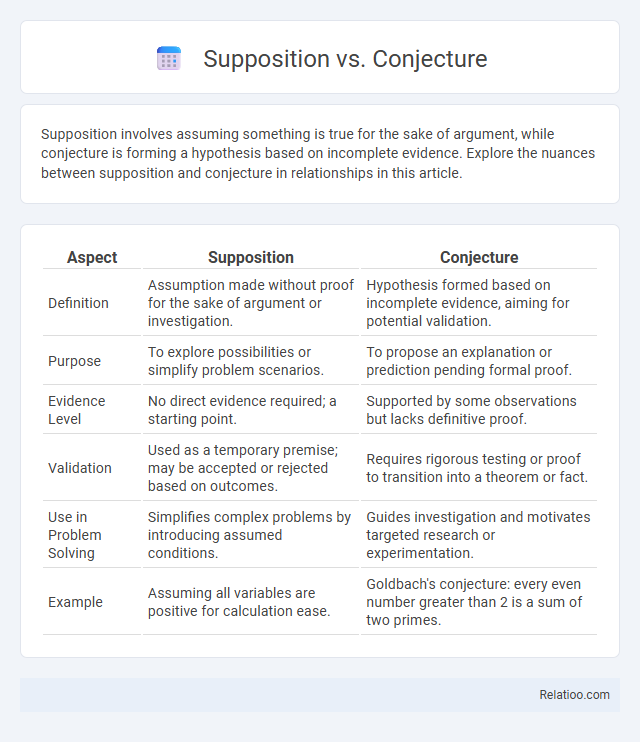Supposition involves assuming something is true for the sake of argument, while conjecture is forming a hypothesis based on incomplete evidence. Explore the nuances between supposition and conjecture in relationships in this article.
Table of Comparison
| Aspect | Supposition | Conjecture |
|---|---|---|
| Definition | Assumption made without proof for the sake of argument or investigation. | Hypothesis formed based on incomplete evidence, aiming for potential validation. |
| Purpose | To explore possibilities or simplify problem scenarios. | To propose an explanation or prediction pending formal proof. |
| Evidence Level | No direct evidence required; a starting point. | Supported by some observations but lacks definitive proof. |
| Validation | Used as a temporary premise; may be accepted or rejected based on outcomes. | Requires rigorous testing or proof to transition into a theorem or fact. |
| Use in Problem Solving | Simplifies complex problems by introducing assumed conditions. | Guides investigation and motivates targeted research or experimentation. |
| Example | Assuming all variables are positive for calculation ease. | Goldbach's conjecture: every even number greater than 2 is a sum of two primes. |
Understanding Supposition and Conjecture
Supposition refers to an assumption or belief accepted without proof, often used as a starting point for reasoning or hypothesis. Conjecture involves forming an opinion or conclusion based on incomplete information, typically requiring further evidence for validation. Understanding the distinction helps clarify that supposition serves as a foundational guess, while conjecture is an inferred judgment pending confirmation.
Defining Supposition: Meaning and Usage
Supposition refers to the act of assuming something to be true without definite proof, often used as a basis for reasoning or argumentation in philosophy and everyday discourse. It involves a hypothesis or a premise accepted for the sake of discussion, distinguishing it from conjecture, which emphasizes hypothesis generation based on incomplete evidence, and assumption, which may be more implicit or taken for granted. Understanding supposition is crucial for critical thinking, as it underpins the formation of arguments and theoretical models in various fields.
Exploring Conjecture: What Does It Entail?
Conjecture involves forming a hypothesis based on incomplete evidence, aiming to propose potential explanations or predictions within scientific or mathematical contexts. It differs from supposition, which is a more general assumption or premise without strong evidence, and presumption, which often implies a higher likelihood or accepted probability. Exploring conjecture entails evaluating its basis through logical reasoning and empirical testing to move from an initial guess toward validated knowledge.
Core Differences Between Supposition and Conjecture
Supposition involves assuming something is true for the sake of argument, often based on limited evidence or hypothesis, while conjecture refers to a conclusion formed without complete information, relying heavily on guesswork and speculation. Your understanding deepens by recognizing that supposition is more structured and used as a premise in logical reasoning, whereas conjecture is more uncertain and speculative, typically forming the basis for further investigation. Distinguishing these core differences enhances critical thinking and clarity in analytical discussions.
Origins and Etymology of the Terms
The term "supposition" originates from the Latin word "suppositio," meaning "a placing under" or "assumption," reflecting its use in philosophical and logical contexts. "Conjecture" stems from the Latin "coniectura," derived from "conicere," which means "to throw together," signifying an inference based on incomplete evidence. Both terms evolved during the Middle Ages in scholarly debates, with "supposition" emphasizing presumed acceptance and "conjecture" focusing on hypotheses formed without definitive proof.
Practical Examples of Supposition
Supposition involves assuming something as true for the sake of argument or investigation, often used in practical scenarios like hypothesis testing or legal reasoning, where your assumption guides the analysis of evidence. Unlike conjecture, which is an educated guess based on incomplete information, supposition relies on a deliberate premise to explore outcomes or consequences. Practical examples of supposition include assuming a market trend will continue for financial forecasting or presuming a patient's symptoms indicate a specific diagnosis to determine treatment.
Real-World Instances of Conjecture
Conjecture involves forming hypotheses based on incomplete evidence, as seen in Fermat's Last Theorem, which remained unproven for centuries despite extensive mathematical speculation. Supposition refers to assumptions made for argument's sake, often used in logic or hypothetical scenarios without requiring empirical proof. Your understanding of these terms can help distinguish between real-world instances where conjecture drives scientific discovery and theoretical supposition used for illustrative purposes.
Supposition vs Conjecture in Academic Writing
Supposition in academic writing refers to an assumed idea or premise accepted without definitive proof to build a logical argument, while conjecture involves forming a hypothesis based on incomplete evidence, often requiring further validation. Your clarity in distinguishing supposition from conjecture enhances the rigor of academic analysis by ensuring that assumptions are clearly differentiated from tentative conclusions. Emphasizing this distinction strengthens the credibility and precision of scholarly work.
Impact of Supposition and Conjecture in Logical Reasoning
Supposition and conjecture both play crucial roles in logical reasoning by serving as foundational assumptions and hypotheses that guide the development of arguments and theories. Supposition establishes a provisional premise accepted for the sake of argument, enabling the deduction of consequences and testing of validity within logical frameworks. Conjecture involves forming an educated guess or hypothesis based on incomplete evidence, driving exploration and prompting further verification to strengthen logical conclusions.
Choosing Between Supposition and Conjecture
Choosing between supposition and conjecture depends on the level of evidence and certainty in your reasoning. Supposition implies a hypothesis based on limited or assumed information, often used in theoretical or academic contexts, while conjecture suggests a conclusion formed without sufficient proof, leaning more toward speculation. When forming your argument, your choice will shape the perceived strength and credibility of your claims.

Infographic: Supposition vs Conjecture
 relatioo.com
relatioo.com